Last page update:
The APEC Science Prize for Innovation, Research and Education
The APEC Science Prize for Innovation, Research and Education (“ASPIRE”) is an annual award that recognizes young scientists who have demonstrated a commitment to both excellence in scientific research, as evidenced by scholarly publication and cooperation with scientists from other APEC member economies.
ASPIRE supports APEC’s mission to:
- Strengthen international science and technology networks.
- Enhance economic growth, trade and investment opportunities in harmony with sustainable development, through policies, innovative R&D and technologies, and knowledge sharing.
- Improve linkages and efficiency between research and innovation.
ASPIRE 2022: Innovation to achieve economic, environmental, and social goals
Each year the APEC host economy is asked to provide a theme to guide nominations for ASPIRE to be awarded in their host year. For its host year of 2022, Thailand selects “Innovation to achieve economic, environmental, and social goals” as the ASPIRE nominating theme.
This theme focuses on advancing the integration of a Bio-Circular-Green (BCG) Economy Model among APEC members, as well as environmental, social and governance (ESG) practices and the responsible business conduct (RBC) in the private sector. With this theme, ASPIRE 2022 would like to showcase impactful and meaningful researches that are able to transform the whole of society to become more balanced and sustainable. This may include researches that encourage biological advances, promote sustainability, or achieve better understanding of agricultural systems. Nominees should demonstrate a commitment to excellence in scientific research and cooperation with scientists from other APEC member economies, including inclusive and interdisciplinary collaborations, in subjects such as: biology, chemistry, environmental science, physics, mathematics, economics, social sciences, and other relevant fields.
ELIGIBILITY
Any citizen of an APEC member economy is eligible to be nominated for ASPIRE. They must be under the age of 40 as of 31 December of the year of their nomination (i.e., all 2022 nominees must be under the age of 40 as of 31 December 2022).
SELECTION PROCESS
Each member economy, through its representative in the APEC Policy Partnership for Science, Technology and Innovation (PPSTI), is invited to nominate one young scientist to be considered for ASPIRE.
Applicants are encouraged to complete the “ASPIRE 2022 Nomination Form” and send it to the Program Director of PPSTI, Ms. Piang-or Wacharaprapapong ([email protected]) and to Ms. Karen Kwan ([email protected]) by 29 April 2022 so that the nominations may be directed towards local-economy reviewers.
Once nominations are received, PPSTI members rank the nominees through a selection ballot to determine the winner. PPSTI members will be asked to judge the nominees based on how well they have demonstrated:
- Excellence in scientific research, as evidenced through scholarly publication.
- Commitment to cooperation with scientists from other APEC member economies.
- Contribution to the theme of “Innovation to achieve economic, environmental, and social goals”.
The winner will be recognized at an award ceremony during the APEC PPSTI Meeting hosted by Thailand tentatively scheduled for August 2022.
ASPIRE PRIZE SPONSORS
Wiley and Elsevier, two of the world’s leading publishers of scholarly scientific knowledge, have committed to funding the prize money of USD25,000.
ASPIRE PRIZE WINNERS
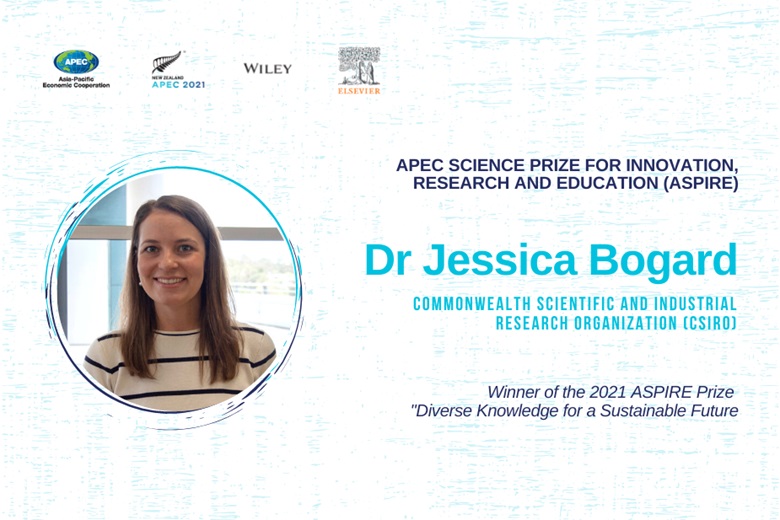 | 2021: Diverse Knowledge for a Sustainable Future Dr Jessica Bogard, a dietitian and public health nutritionist from Australia, was awarded the 2021 ASPIRE, for her research focusing on boosting the potential of underutilized local and indigenous food to reduce malnutrition, particularly among pregnant women and young children. Dr. Bogard pioneered the development of a database of nutritional quality of more than 50 species of fish and aquatic food and found that certain indigenous species of fish are rich sources of a multitude of micronutrients, but their availability is declining. She is a research scientist at the Commonwealth Scientific and Industrial Research Organisation (CSIRO) Australia. | |
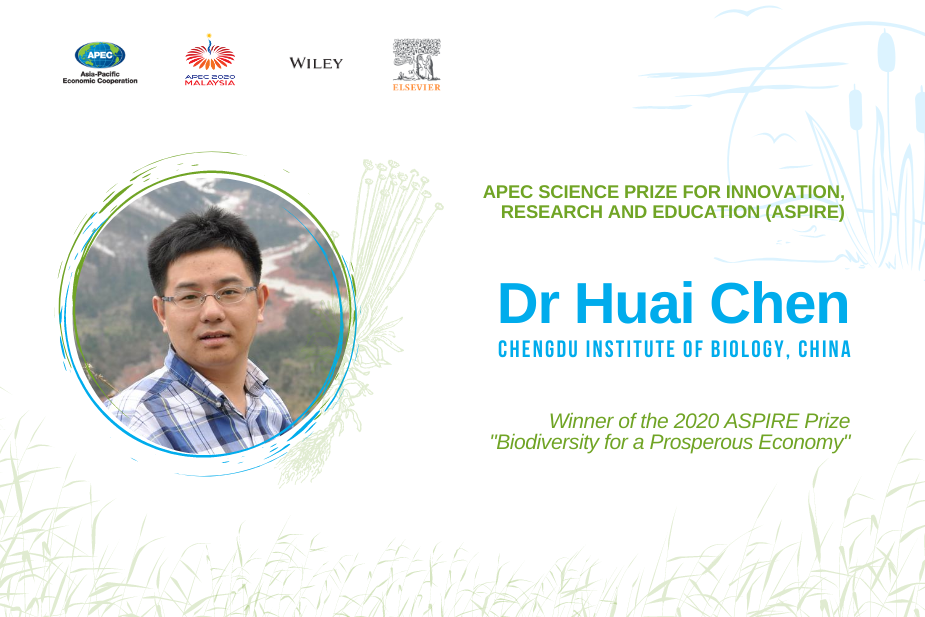 | 2020: Biodiversity for a Prosperous Economy Dr Huai Chen was awarded the 2020 ASPIRE at an online ceremony by Dr. Siti Hamisah Tapsir, Secretary General, Ministry of Science, Technology and Innovation (MOSTI) Malaysia Dr Chen is a professor at Chengdu Institute of Biology, Chinese Academy of Sciences. His research focused on wetland biodiversity and nature’s contribution to people. Dr. Chen’s findings led to a better understanding of these
wetlands including protecting, and developing new generation models for methane emissions as well as enhancing assessment of carbon storage and ecological value. | |
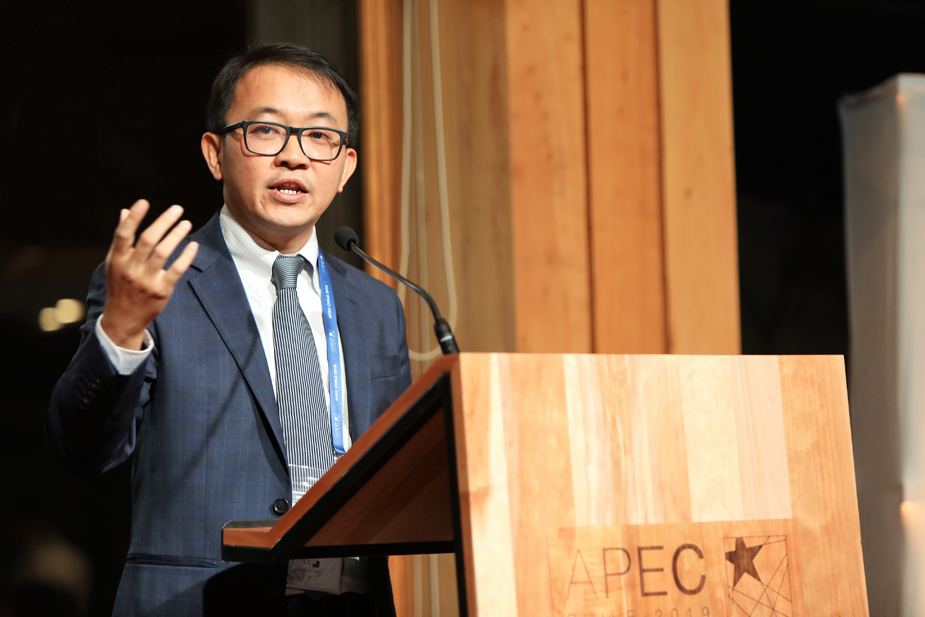 | 2019: Smart Technolgies for Healthy Societies Dr Yun Hau NG was awarded the 2019 ASPIRE in Puerto Varas, Chile by Dr. Nicole Ehrenfeld, Director of the Scientific Initiative Millennium, Ministry of Economy, Chile. Dr Ng is an associate professor at the School of Energy and Environment,
City University of Hong Kong, China. His research focused on the development of highly efficient photocatalytic systems to mimic natural photosynthesis to produce clean hydrogen from water. In short, he used sunlight to split water
into clean hydrogen. | |
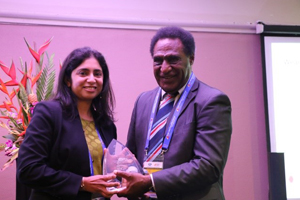 | 2018: Smart Technologies for Healthy Societies Dr Madhu Bhaskaran of Australia was awarded the 2018 ASPIRE in Port Moresby by the Hon. Pila Niningi, Minister for Higher Education, Research, Science and Technology of Papua New Guinea. Dr Bhaskaran is a professor at the Royal Melbourne
Institute of Technology (RMIT) University, Melbourne, Australia where her work transformed the way we imagined, used and interacted with electronic devices and sensors. She developed ways to combine functional oxide materials processed
at high temperatures with elastic and plastic materials. Her work led to the development of wearable elastic electronics and sensors, including gas and UV sensors and flat optical devices—all of which are stretchable, optically
transparent and as thin as a nicotine patch. | |
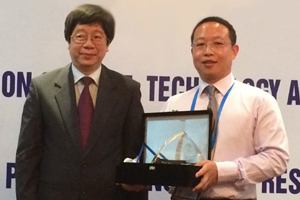 | 2017: New Material Technologies—Dr Yanwu Zhu (China) Dr Yanwu Zhu of China was awarded the 2017 ASPIRE in Ha Noi by Deputy Minister of Science and Technology of Viet Nam, Tran Quoc Khanh. Dr Zhu is a Professor at the University of Science and Technology of China where he researched the fields
of nanomaterials and specifically new carbon materials. His publications were widely cited and his research with other APEC scientists were applied in large-scale production of graphene materials.
| |
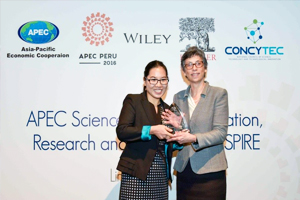 | 2016: Technologies for Food Security—Dr Hua Kuang (China) Dr Hua Kuang of China was awarded the 2016 ASPIRE Prize in Lima by Dr Gisella Orjeda, President of the Peruvian National Council for Science, Technology and Technological Innovation (CONCYTEC). Dr Kuang is a Professor at Jiangnan University’s
School of Food Science and Technology in Wuxi, China, where she worked with researchers in other APEC economies to develop low-cost biosensors that detect food sanitation hazards. Her patented technologies were used to improve food
safety for millions in China and elsewhere. | |
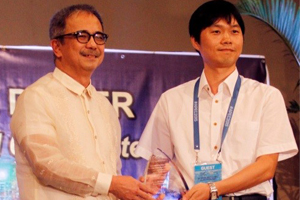 | 2015: Disaster Risk Reduction: Understanding the Role of Climate Change and Variability—Dr Jong-Seong Kug (Republic of Korea) Dr Jong-Seong Kug was awarded the 2015 ASPIRE in Manila by Secretary Mario Montejo of the Philippine Department of Science and Technology. Dr Kug is an Associate Professor at Pohang University of Science and Technology’s School of
Environmental Science and Engineering in Korea, and his El Niño prediction model helped the Korea Meteorological Administration better understand tropical climate dynamics, and forecast and track extreme weather—an area
that addressed Philippines’ theme of “Disaster Risk Reduction: Understanding the Role of Climate Change and Variability.” | |
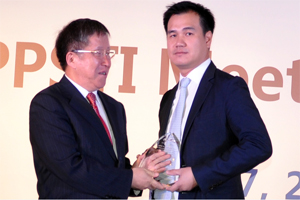 | 2014: Intelligent Transportation--Dr Agachai Sumalee (Hong Kong, China) Dr Agachai Sumalee, a Thai professor at the Hong Kong Polytechnic University, was awarded the 2014 ASPIRE by Cai Jianlin, China’s Vice Minister of Science and Technology. China selected the theme of “Intelligent Transportation”
to reflect China’s interest in facilitating green and sustainable growth, environmental protection and low-carbon economies. Dr Sumalee designed a model in collaboration with researchers from across the APEC region that allowed
highway managers to predict traffic conditions and prevent congestion. This led to ground breaking road traffic management system that slashed commuting times in the greater Bangkok area. | |
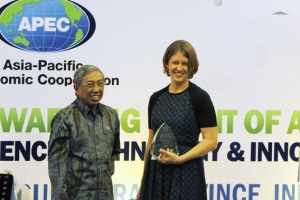 | 2013: Sustainable Ocean Development—Dr Carissa Klein (Australia) Dr Carissa Klein of Australia was awarded the 2013 ASPIRE by Gusti M. Hatta, Indonesia’s Minister of Research and Technology. Dr Klein’s selection was a result of her research with the University of Queensland that uniquely
addressed the issue of sustainable ocean development by striking a balance between biodiversity conservation and socioeconomic viability. | |
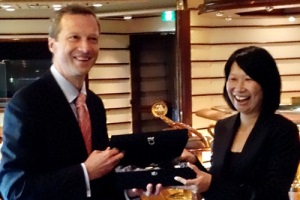 | 2012: Health Innovation—Dr Rossa Wai Kwun Chiu (Hong Kong, China) Russia selected health innovation as its 2012 ASPIRE nominating theme, building on its desire that APEC actively fosters cooperation among economies in major innovation areas, such as human health, to support healthy lifestyles, productivity
and economic growth. Dr Chiu’s groundbreaking research and innovations in chemical pathology brought non-invasive prenatal diagnosis of fetal genetic diseases into routine clinical use around the world. | |
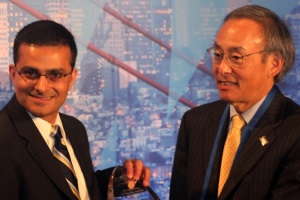 | 2011: Green Growth—Dr Ali Javey (United States) The United States selected green growth as its ASPIRE nominating theme, building on its desire that APEC actively promotes environmentally sustainable economic growth and development, and helps economies successfully transition to a clean
energy future. Dr Javey’s innovative work with nanomaterials made great strides in developing a new generation of solar energy technology and reducing energy consumption in "green electronics." | |

